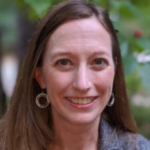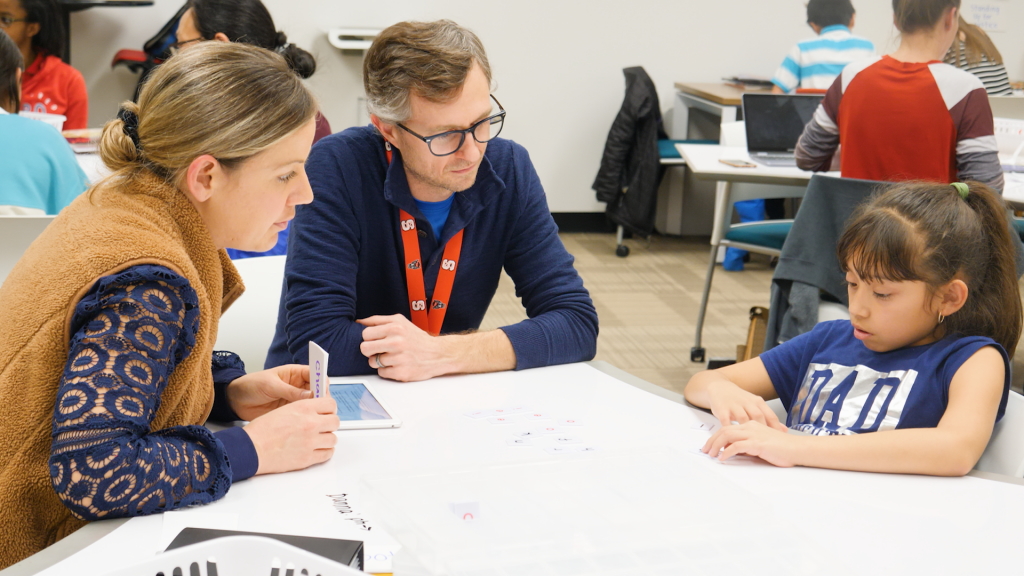The Ph.D. in Teacher Education and Learning Sciences: Literacy and English Language Arts (LELA) Education concentration is designed for individuals with interests in literacy, reading development, new literacies, and English Language Arts education research, scholarship, and teacher preparation.
The concentration prepares students for roles as teacher educators and researchers in higher education or instructional leadership roles at school, district, and state levels, or education-related private industry. Individuals seeking admission to this concentration should have a strong background in this area and a desire to conduct original research in these fields.
This concentration addresses
- Literacy or English Language Arts content specialization
- Models of reading and language development with implications for classroom instruction, assessment, and intervention
- Theory and research in literacy
- Preparation for professional roles as researchers and teacher educators
Concentration Details
DESCRIPTION
Our concentration includes a network of strong relationships with local public schools and community partners, such as pre-service teacher field placement partnerships; professional development partnerships with school districts across the state; collaboration on research with students and teachers in local public schools; and community partners including Refugee Hope Partners, Juntos NC, and CORRAL Riding Academy. Connections to public schools and community organizations help to foster interdisciplinary field-based research projects, which provide opportunities for our doctoral candidates to work with faculty in mentored research initiatives. Faculty and doctoral students in the LELA concentration also collaborate on projects with partners across the College and University, including the Friday Institute for Educational Innovation and the Center for Family and Community Engagement.
The LELA concentration faculty conducts research in a variety of areas, including: teaching English Language Arts (ELA) in the digital age; reading comprehension, assessment, and intervention; digital literacies; preparation of literacy and ELA educators; writing and technology; visual and content analyses of children’s and young adult literature; content-area knowledge and literacy development; vocabulary and academic language instruction; coaching professional development; evidence-based practices in literacy instruction; community-based research; underserved students including immigrant and refugee youth; global perspectives of culture and literacy; and trauma-informed family literacy.
ADMISSION REQUIREMENTS
- Completed application to the NC State Graduate School
- Master’s degree from an accredited institution of higher education with a minimum 3.0 GPA
- Unofficial transcripts from undergraduate and any graduate programs
- Resume or curriculum vitae
- Personal statement. You are applying to a Ph.D. in Teacher Education and Learning Sciences, with a concentration in Literacy and English Language Arts. A centerpiece of this program is that you will identify and develop a research focus and engage in the production of new knowledge in the form of publications and professional presentations. The purpose of this statement is to match your research interests with faculty expertise. Few students enter with fully-formed research agendas, and many discover their research interests through conversations with faculty. We strongly encourage you to visit faculty websites and reach out to faculty you may be interested in working with. In a well-organized 2-3 page personal statement, please address the following questions: 1) What areas of literacy and English Language Arts are of particular interest to you? 2) What professional and educational experiences have prepared you to pursue a doctorate in literacy and English Language Arts? 3) What do you currently envision as your research focus in literacy and English Language Arts? 4) In what ways might your research focus align with faculty expertise/scholarship in the Literacy and English Language Arts Ph.D. concentration?
- Academic writing sample (e.g., master’s thesis, class paper, manuscript, research report, or white paper)
- Three letters of recommendation (at least one should be from a professor or someone who can comment on research experience or academic preparation for a PhD; the others may be professional references)
- At least 3 years of K-12 teaching experience in literacy, reading, English Language Arts, or related areas (preferred)
- No GRE is required for 2025 admissions
COURSE OF STUDY
The TELS Ph.D. requires 72 credit hours, including a minimum of 60 hours beyond a master’s degree. The LELA concentration requires the following specific course of study:
College of Education Scholar-Leader courses (6 hours)
- ED 755 Diversity & Equity in Schools and Communities (3 hours)
- ED 756 Systemic Change in Education (3 hours)
TELS core courses (6 hours)
- ECI 735 Seminar on Teaching and Teaching Education (3 hours)
- ECI 736 Learning Sciences (3 hours)
LELA required courses (6 hours)
- ECI 745: Literacy Theory and Research (3 hours)
- ECI 803: Advanced Studies in Literacy Research (3 hours)
Research methods courses (15 hours)
- ED 710: Applied Quantitative Methods in Education (3 hours)
- ED 730: Qualitative Methods in Education (3 hours)
- Additional 9 hours of advanced research methods
LELA electives (18 hours):
- Courses are to be chosen within the program area of study, as well as other programs throughout the department, college, and university.
Dissertation Research (9 hours)
TUITION & FEES
Review the Estimated Cost of Attendance for information on tuition and fees set by the university. Students are funded through a variety of opportunities, some of which cover tuition and fees. StipendS and length of appointment vary based on funding source.
- Graduate Research Assistantships: Research assistantships are awarded to students working with a faculty member on an externally-funded research grant. Individual faculty select students for these awards.
- Teaching Assistantships: Teaching assistantships are awarded to students with applicable experience to teach undergraduate courses or supervise teacher interns. Students are selected based on department needs.
- College Fellowships: Offices in the College of Education regularly offer assistantships for research and teaching positions. These are announced each spring.
- University Fellowships: The Graduate School offers several fellowships for new students, including the University Graduate Fellowship and the Provost’s Fellowship. The Director of Graduate Programs nominates applicants for these awards.
- External Fellowships: Applicants are encouraged to apply for fellowships from the National Science Foundation and other national programs.
Eligible students may receive coverage of their tuition and health insurance through the Graduate Student Support Plan (GSSP). Opportunities are available on a limited basis, and vary in: stipend amount; length of appointment; research/teaching area that is your focus; technical, research, and teaching skill required; and where you are in your program timeline to completion. Therefore, funding is not guaranteed.
All applicants are automatically considered for funding opportunities that require department nomination. To express interest in being considered for other departmental funding, please complete the TELS Funding Interest Form.
FACULTY
Title: Assistant Teaching Professor
Ph.D.: NC State University
Sarah Cannon, Ph.D., is interested in how to best support teacher candidates during a standardized performance-based assessment, the intersection of the standards movement with the critical need for multicultural education, and writing instruction as a tool for social justice.

Title: Associate Professor
Ph.D.: Vanderbilt University
Dennis Davis, Ph.D., focuses on upper-elementary literacy instruction with an emphasis on reading comprehension, assessment and intervention support for students when they have difficulties in reading.

Title: Associate Professor
Ph.D.: Vanderbilt University
Jill Grifenhagen, Ph.D., focuses on academic language and literacy learning in early childhood classrooms (PreK-3rd grade) and teacher development and supports increasing teacher efficacy in these areas.

Title: Assistant Teaching Professor
Ph.D.: NC State University
Jill Jones, Ph.D., focuses on teacher scaffolding in small-group reading instruction, intervention for students needing more support in reading, and effective literacy instruction in elementary classrooms.

Title: Goodnight Distinguished Professor in Early Literary
Ph.D.: Vanderbilt University
Devin Kearns Ph.D., studies how students in elementary grades learn to read and designs instructional programs to better meet the needs of these students. .

Title: Assistant Professor
Ed.D.: Columbia University
Crystal Chen Lee, Ed.D., focuses on literacy, teacher education, community engagement, and marginalized youth. She examines how literacy, especially critical literacy, can lead to increased youth advocacy, leadership and community engagement for marginalized youth.

Title: Assistant Professor
Ph.D.: University of North Carolina at Chapel Hill
Jackie Relyea, Ph.D., focuses on literacy development of K-6 multilingual students and literacy intervention that emphasizes academic vocabulary and content knowledge development, and reading engagement.

Title: Associate Professor
Ph.D.: University of Pennsylvania
Angela Wiseman, Ph.D., focuses on children’s literature and family literacy, with a specific focus on the use of picturebooks and trauma-informed literacy.

Title: Associate Professor
Ph.D.: University of Virginia
Carl Young, Ph.D., focuses on new literacies and related theories and practices that are motivated by emerging digital technologies including social media as a tool for enhancing ELA content knowledge and digital video as narrative text and project-based inquiry.
CURRENT DOCTORAL STUDENTS
- Michael Anderson, Research Interests: Visual literacy, Critical Theory, Curricular Theory (Advisor: Dr. Michelle Falter)
- Sarah Dawson, Research Interests: Writing, Teacher Identity, Linguistic Diversity, Trauma-informed Practices (Advisor: Dr. Angela Wiseman)
- Corrie Dobis. Research Interests: Multiliteracies, Visual Literacy, Multimodality, Multilingual Learners (Advisor: Dr. Jill Grifenhagen)
- Caitlin Donovan. Research Interests: Critical Digital Literacies, Digital Writing Communities, e-Learning Design, and Teacher Preparation (Advisor: Dr. Crystal Chen Lee)
- Samantha Duke, Research Interests: Teacher Preparation, Writing Instruction, Transfer of Learning (Advisor: Dr. Carl Young)
- Xinyan Fu, Research Interests: Literacy Intervention in Teaching English as a Second or Foreign Language, Elementary and Middle School Reading and Literacy Education. (Advisor: Dr. Jackie Relyea)
- Callie Hammond, Research Interests: Historical Knowledge in the English Classroom; Representations of the Holocaust in Picturebooks and YA; Gendered Responses to Literature (Advisor: Dr. Jill Grifenhagen)
- Haleema Khalil, Research Interests: Multilingual Learners, Diverse Representation in Literature, Critical Literacy, Digital Literacy (Advisors: Dr. Jackie Relyea & Dr. Crystal Chen Lee)
- Bethany Lewis, Research Interests: Writing and Literacy Instructional Methods, Children’s Literature, Diverse Books, Teacher Identity (Advisor: Dr. Angela Wiseman)
- Jennifer C. Mann, Research Interests: Critical Literacy, Multilingual Education, Marginalized Students (Advisor: Dr. Crystal Lee)
- Janell Miller, Research Interests: Critical Theory, Critical Consciousness, Culturally Sustaining Pedagogy, Classroom Discourse, Restorative Justice Education (Advisor: Dr. Carl Young)
- Sarah Montello, Research Interests: Multilingual Learners, Teacher Education, Social Constructivist Pedagogy, Inquiry Based Learning (Advisors: Dr. Jill Grifenhagen & Dr. Carl Young)
- Amber Moore, Research Interests: Teaching Historical Violence; Literature as a Facilitator of Civic Engagement; Exploring Loss, Grief, and Death through Children’s and YA Literature. (Advisor: Dr. Angela Wiseman)
- Katie Peachey, Research Interests: Writing Instruction and Teacher Feedback, Emotion, Motivation, and Identity (Advisors: Dr. Crystal Chen Lee & Dr. Michelle Falter)
- Beth Poteat, Research Interests: preservice teacher education and identity development, culturally-responsive pedagogies, reading and writing in the middle grades, trauma-informed practices, social-emotional learning, rural education (Advisor: Dr. Carl Young)
- Courtney Samuelson, Research Interests: Literacy Intervention, Critical Theory, Instructional Coaching (Advisor: Dr. Dennis Davis)
- Amy Walter, Research Interests: Secondary Reading, Middle Grades, Use of AI in Teacher Planning, Equity in Education, Teacher Preparation (Advisor: Dr. Dennis Davis)
- Alicia Whitley, Research Interests: Critical Theory, Multimodal Literacies, Representative Literature and YA (Advisor: Dr. Michelle Falter)
Study at one of the world’s best colleges of education
#1
in N.C. among colleges of education in active research activity (U.S. News)
#30
ranked college of education in the nation (U.S. News)
#60
in education and educational research among universities in the world (U.S. News)

